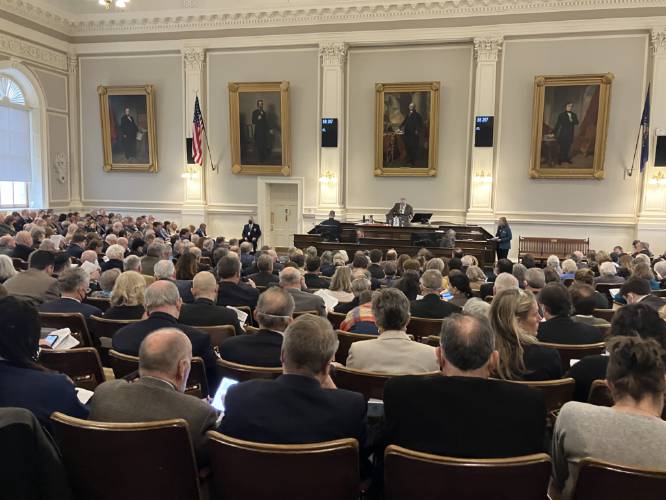NH House passes bill to ban gender-affirming care for minors, sending bill to Senate

The New Hampshire House voted 199-175 in favor of a bill to ban gender-affirming care for minors on Thursday. ETHAN DEWITT / New Hampshire Bulletin
| Published: 01-04-2024 2:45 PM |
The New Hampshire House passed a bill to ban gender-affirming procedures for minors Thursday, in a 199-175 vote that edges the bill closer to Gov. Chris Sununu’s desk.
House Bill 619 would prohibit a doctor or other health care professional from carrying out “genital gender reassignment surgery” to anyone in New Hampshire under 18. It would also prohibit health care workers from referring minors to facilities out of state that offer those procedures.
If signed into law by Sununu, New Hampshire would be the 21st state to enact such a ban, after Arkansas, Florida, Georgia, Idaho, Indiana, Iowa, Kentucky, Louisiana, Mississippi, Missouri, Montana, Nebraska, North Carolina, North Dakota, Oklahoma, South Dakota, Tennessee, Texas, Utah, and West Virginia, according to U.S. News and World Report.
“Until 16 months ago, these procedures were prohibited by (medical) guidelines,” said Rep. Erica Layon, a Derry Republican one of the bill’s sponsors.
Layon argued that the state should bar the procedure until more data is available from states that do offer the procedures to minors. “We need to wait,” she said. “We need to pause.”
Rep. Gerri Cannon, a Somersworth Democrat and New Hampshire’s first elected transgender lawmaker, spoke strongly against the bill.
“Adopting this bill is different than anything we’ve done in this House,” said Cannon. She noted the statutory ban will need to be continually updated in order to keep up with medical practices. And she highlighted the “many excellent care providers in NH providing their services” using the best skills and information available.
“But that’s their job, not ours,” she said.
Article continues after...
Yesterday's Most Read Articles
The bill defines genital gender reassignment surgery to mean any procedure to assist a person with a gender transition, and includes penectomies, orchiectomies, vaginoplasties, clitoroplasties, vulvoplasties, phalloplasties, vaginectomies, scrotoplasties, and others.
The ban does not extend to “services to persons born with a medically verifiable disorder of sex development,” such as when a person’s external biological sex characteristics are “ambiguous,” according to the bill text. It also does not apply to treatments of infection, injury, disease, or disorder that have been caused by receiving any of the banned surgeries.
Thursday’s decision came amid a string of House votes on bills relating to transgender rights.
Earlier in the day, the House voted against House Bill 264, a bill that would have allowed people to obtain a new birth certificate to reflect their gender identity; currently, people must obtain a court order for that.
The House also voted to pass House Bill 396, which would allow the state and public bodies like schools to differentiate based on sex in athletic competitions, incarceration, or “places of intimate privacy.”
Unlike past votes on LGBTQ+ issues, the vote in favor of the gender-affirming care ban for minors did not fall fully along party lines; 12 Democrats joined Republicans in voting yes and two Republicans voted against it.
Rep. Jonah Wheeler, a Peterborough Democrat, broke from his party in a speech before the vote.
“This is a question of whether or not you believe children should be able to get an irreversible surgery,” Wheeler said.
“So yeah, despite being a liberal who believes in human rights, I do not think that children should be able to get irreversible surgery. So I’ll take all the heat that comes from this.”
And Rep. Dan Hynes, who was elected as a Republican but has switched to be an independent, broke in the other direction.
“This amendment goes against parental rights, and goes against medical freedom, particularly for patients to be able to decide whether they get that treatment, which could prevent their suicide, which is also irreversible,” Hynes, of Bedford, said in a speech.
The bill heads next to the Republican-led Senate, which appears likely to support it. Chris Erchull, a staff attorney for GLBTQ Legal Advocates & Defenders (GLAD), said the issue could come down to Sununu.
“It looks like this is going to be up to Governor Sununu to decide whether or not he is going to cave to the interests of people who are out to get transgender people or whether he will follow in the footsteps of (Gov.) Mike DeWine in Ohio and veto harmful legislation that targets the rights of trans people,” Erchull said in an interview after the vote.







 New Hampshire school phone ban could be among strictest in the country
New Hampshire school phone ban could be among strictest in the country Concord became a Housing Champion. Now, state lawmakers could eliminate the funding.
Concord became a Housing Champion. Now, state lawmakers could eliminate the funding. ‘A wild accusation’: House votes to nix Child Advocate after Rep. suggests legislative interference
‘A wild accusation’: House votes to nix Child Advocate after Rep. suggests legislative interference  Sununu decides he won’t run for Senate despite praise from Trump
Sununu decides he won’t run for Senate despite praise from Trump
